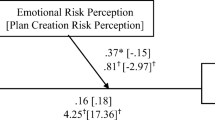Abstract
Background. We investigated the efficacy of breast cancer prevention messages in increasing intentions to be more active. Method. We randomly assigned 200 females aged 30–60 years to a breast cancer and physical activity message or a cardiovascular disease and physical activity message. Results. The breast cancer message was more believable and slightly more motivating to increase physical activity than the cardiovascular disease message, and 72% of respondents in the breast cancer condition increased their intention to increase their physical activity. Conclusion. The benefit of reducing the risk of breast cancer can be used to motivate increased physical activity in women.
Similar content being viewed by others

References
Parkin DM, Bray F, Ferlay J, et al. Estimating the world cancer burden: Globocan 2000. Int J Cancer. 2001;94:153–156.
Australian Institute of Health and Welfare. Australia’s Health 2006. AIHW Cat. No. AUS73. Canberra: Australian Institute of Health and Welfare, 2004.
Powell KE, Blair SN. The public health burdens of sedentary living habits: theoretical but realistic estimates. Med Sci Sports Exerc. 1994;26:851–856.
The Cancer Council Australia. National Cancer Prevention Policy 2004-06. New South Wales, Australia: The Cancer Council Australia, 2004.
Friedenreich CM, Orenstein MR. Physical activity and cancer prevention: etiologic evidence and biological mechanisms. J Nutr. 2002;132:3456S-3464S.
World Health Organization. The World Health Report 2002: Reducing risks, promoting healthy life. Geneva, Switzerland: World Health Organization, 2002.
Mock V, McCorkle R, Ropka ME, et al. Fatigue and physical functioning during breast cancer treatment. Oncol Nurs Forum. 2002;29:337.
Pinto BM, Maruyama NC. Exercise in the rehabilitation of breast cancer survivors. Psychooncology. 1999;8:191–206.
Minneapolis LS. Can exercise improve breast cancer survival? Physician Sportsmedicine. 2004;32:13–17.
Holmes MD, Chen WY, Feskanich D, et al. Physical activity and survival after breast cancer diagnosis. JAMA. 2005;293:2479–2486.
Donovan RJ, Jones S, Carter O, et al. A national survey of metropolitan Australians’ beliefs about cancer. Perth, Australia: Centre for Behavioural Research in Cancer Control, Curtin University, 2003.
Jalleh G, Donovan RJ, Slevin T, et al. Efficacy of bowel cancer appeals for promoting physical activity. Health Promot J Aust, 2005;16:107–109.
Gerlach KK, Marino C, Hoffman-Goetz L. Cancer coverage in women’s magazines: what information are women receiving? J Cancer Educ. 1997;12:240–244.
Gerlach KK, Marino C, Weed DL, et al. Lack of colon cancer coverage in seven women’s magazines. Women Health. 1997;26:57–68.
Hoffman-Goetz L, Gerlach KK, Marino C, et al. Cancer coverage and tobacco advertising in African-American women’s popular magazines. J Community Health. 1997;22:261–270.
Hoffman-Goetz L, MacDonald M. Cancer coverage in mass-circulating Canadian women’s magazines. Can J Public Health. 1999;90:55–59.
Australian Government, Department of Health and Aging. Breast-Screen Australia, Program. Available at: http://www.breastscreen. info.au/internet/screening/publishing.nsf/Content/breastscreen-1lp. Accessed August 8, 2005.
Chapman S, McLeod K, Wakefield M, et al. Impact of news of celebrity illness on breast cancer screening: Kylie Minogue’s breast cancer diagnosis. Med J Aust. 2005;183:247–250.
Phillip BS, Owen N, Lambert EV, et al. Promoting physical activity: the new imperative for public health. Health Educ Res. 2000;15:367–376.
Author information
Authors and Affiliations
Corresponding author
Rights and permissions
About this article
Cite this article
Jalleh, G., Donovan, R.J., Slevin, T. et al. Efficacy of breast cancer appeals for promoting physical activity. J Canc Educ 24, 33–35 (2009). https://doi.org/10.1080/08858190802664313
Issue Date:
DOI: https://doi.org/10.1080/08858190802664313



